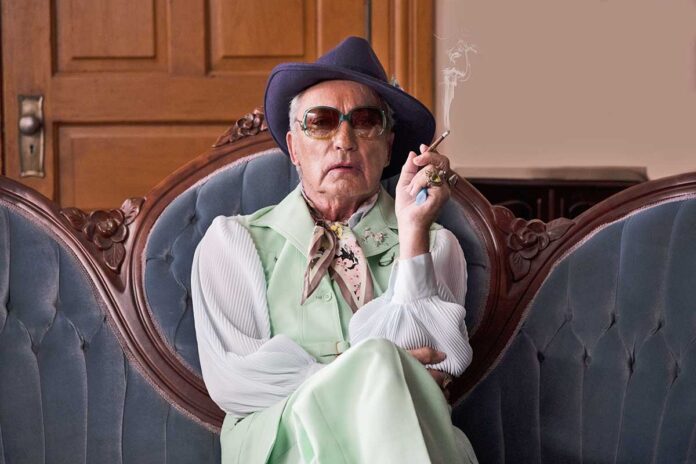“Swan Song,” opening August 6 at the PFS Bourse, and available August 13 on demand, is out gay writer/director Todd Stephens’ long gestating pet project — an homage to Mr. Pat, a gay hairdresser from his hometown of Sandusky, Ohio. Mr. Pat (Udo Kier) once styled all the socialites, but he has now fallen on hard times. Asked to do the hair and makeup for the late Rita Parker-Sloan (Linda Evans), one of his former clients, for her funeral, Pat travels across town, without money, to reluctantly fulfill this request.
On his journey, Pat visits his former home and his lover’s grave, along with his old haunts — the local gay bar and various beauty salons — and reflects back on his life. Stephens lets the film hang in the space between harsh reality and fond memory. He also coaxes an outstanding turn from Udo Kier. The actor exhales sass like smoke from one of his many More cigarettes. Kier is fantastic, jumping rope with kids in one scene, and lip-synching to Robyn with a chandelier on his head in another.
The filmmaker chatted with Philadelphia Gay News about his new film and the real Mr. Pat.
What do you recall about Mr. Pat that made you want to make a film about him, and how did you work with Udo in the role?
Pat was like a rock star in my hometown. He was a tiny man who was super soft-spoken. He would wear these crazy outfits. He was gentle, kind, and interested in people. He spread joy all around. The real Mr. Pat was from West Virginia and from a coal mining town. Udo himself has Mr. Pat qualities innately. There was no way to recreate Mr. Pat entirely. There is no video footage of him. That’s the sad thing about gay history — so much of it is lost. But Udo did ask to see a couple of photographs of Pat. I showed him two photos. Pat always held his hand a certain way, with a Bic lighter in it, and smoked More cigarettes. Udo just incorporated that, and the way Pat held himself, and really captured it. He talked to friends of Pat’s and the spirit of Pat really came through Udo. The spirit of Pat unlocked things inside Udo that are part of Udo that he hasn’t really shown before.
Your film talks rather gracefully about aging and the changes/evolution of the LGBTQ community, such as Grindr vs. gay bars. It gives “Swan Song” some gravitas. What prompted you to address these issues here?
I knew to cast a queer actor. I think that makes a difference. Udo and I said, “Don’t act, just be,” and I think it really comes across. Udo is still beautiful, but when he was young and went into a club everybody was like, “Oh My God!” So, he knows what it feels like to go into a queer club and not be seen in the same way, and to lose friends to AIDS. It didn’t have to be “acted.” That’s what makes him so great in the film.
The most poignant scene — in a film full of poignant scenes — is when Mr. Pat says, “I knew my place,” regarding why he didn’t attend his client’s parties. What observations do you have about growing up gay in a town like Sandusky?
I’ve always, myself, felt like an outsider and that I didn’t belong or fit in. That’s something in all my films, and something I really relate to. With Pat, his clients really adored him. They knew he was gay, and they never really talked about it, or integrated him into their lives beyond sitting in Pat’s chair. Yet Pat probably knew more about them than their husbands did. It’s just a thing with people in service jobs and queer culture not really being integrated openly in mainstream culture back in the day in Sandusky. That’s completely changed now entirely. As Eunice (Ira Hawkins) says to Pat in the film: Who needs the Fruit and Nut [gay bar], because you can hold hands at Applebees? Back in the day, we needed that safe space. The Fruit and Nut was an instant family, and that family is gone now. I wanted to show that queer spaces everywhere are melting away. It’s amazing how far we have come, but it’s bittersweet — there’s a loss of a world.
Yes, it’s been encouraging to see your filmography go from the coming-of-age film “Edge of Seventeen” to “Swan Song.”
I’m used to making gay-themed films with gay characters that were pretty much marketed to the gay audience. We hoped that “Edge of Seventeen,” and “Gypsy ‘83” would “crossover” to beyond just a gay audience. I always wanted to do that with those films, but it was impossible back in the day. And now it’s finally happened with “Swan Song,” and it’s really amazing. I’m happy to have finally made a movie that does seem to be crossing over.
